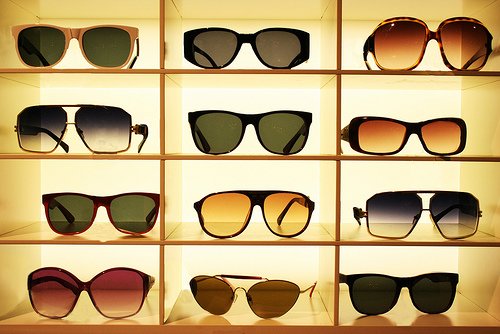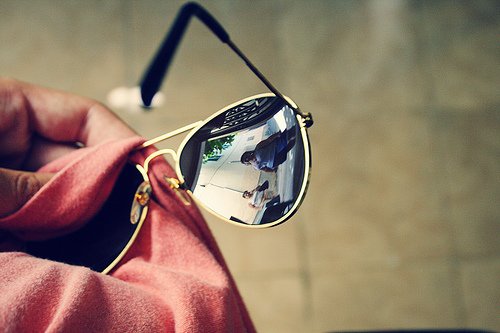Dark or, more correctly, sunglasses are an accessory beloved by both men and women. It is not always used for its intended purpose — jokes are still popular about how many girls use "the most fashionable glasses this season" exclusively as a hair band. Someone does not imagine existence without sunglasses so much that he stays in them even in the evening, when the sun has long gone below the horizon, both in a cafe and in a club. And this can be understood, because properly selected glasses can favorably correct the shape of the face and give a person a special charm.
Sunglasses become an integral part of the image, a favorite thing and a collectible. But today we will discuss the extremely practical side of wearing sunglasses: actually, do they protect from the sun and do our eyes really need it? Or is sunlight more useful than harmful?

Discussing this issue, experts answer unanimously — ultraviolet radiation harms the retina of our eyes. It can cause retinal burns and, as a result, premature deterioration of vision and even blindness.
However, our eyes get quite a bit of ultraviolet light: the harshest and most harmful UV rays are delayed by the ozone layer, some of the radiation is blocked by the lens in our eyes. But even the minimum that still reaches the retina can lead to problems. Surely you have noticed that on a particularly sunny day, the eyes get very tired, they literally hurt. And it's not for nothing that we start squinting, trying to somehow reduce the incoming flow of light, our body knows better than us what is harmful to it and what is useful, and does not want to let too much sunlight pass to the retina.
By the way, this causes wrinkles around the eyes. I understand that we are unlikely to frighten men with this fact, but nevertheless, why age your face if there is an opportunity to avoid it?
So, drawing conclusions from all of the above, we can definitely say that you will definitely need sunglasses:
But it is better to avoid wearing glasses indoors, in transport, in cloudy weather, in the evening, when the sunlight is soft and does not blind. The fact is that the constant wearing of glasses can develop a fear of light — photophobia. And then even minimal light will cause you severe discomfort.
The second question arises: which glasses to choose? They are now being sold literally on every corner. Are not too expensive copies from the store next door suitable for eye protection, or should you go to the optics and fork out for some branded sunglasses?

Here we come to the most interesting. Sunglasses are not always sunglasses. Yes, they reduce the brightness of the color, we feel comfortable, we stop squinting and ... harm our eyes! Because ultraviolet light continues to penetrate through these darkened lenses, and our pupil, deceived by the reduced brightness of light, has expanded and calmly passes these UV rays! In addition, fairly cheap glasses made of low-quality plastic can simply spoil vision (for example, due to the different alignment of the glasses, i.e. due to the fact that the glasses are simply curved), and through them you will see distorted, with incorrect color rendering.
High-quality glasses can be with glass or plastic lenses, but the degree of protection against UV radiation must be written on them. Or the seller must have a certificate for this product, in which all the characteristics must be indicated. Stickers like: "100% UV protection" and "Full absorption of ultraviolet light" should not be believed, especially if they decorate glasses with a price of 300 rubles.
By the way, if we talk about the price of high-quality glasses with UV protection, then in principle you can keep within 1500-2000 thousand rubles. Of course, it is unlikely to be a branded model, but the main thing is eye protection. GUCCI will definitely cost at least 5000 rubles. Of course, it's a bit expensive, in my opinion. But well-known companies value their name and the quality of their products very much, which means that for this amount you will buy not just lenses in a frame, but confidence that the frame will not be skewed on the second day, the screws will not fall out, and the lenses will not be scratched, that the degree of UV protection corresponds to the one specified in the documents, and you don't hurt your eyes.
Wander through professional optics salons, take a look, estimate, read the documentation that they will be able to provide you there. Unfortunately, my search raid on the network showed that in online stores the bet is on the design of frames, but information about UV protection is not indicated. Probably, in such cases, you should write to the support service, clarify the characteristics of the glasses, ask them to send certificates.
And finally, I would like to consider a question that I have always been very interested in personally: what are polarizing and photochromic lenses and do we all need to wear them?

Photochromic lenses are popularly called "chameleons". Chameleons in the room will be ordinary glasses (even if it is sunny enough in the room), and when going outside they will darken, and depending on the intensity of light. The principle of operation of photochromic lenses is based on the content of photochromic substance molecules in the lens material that react to ultraviolet light.
Chameleons have several features at once, which can be safely attributed to the advantages:
It is worth noting that photochromic glasses are not darkened in the car interior, except for special chameleons for drivers.
The essence of polarizing sunglasses is that they block light glare that interferes with our vision. In general, these glare are not particularly critical, so it is not necessary to wear polarizing glasses all the time.
However, there is a category of people for whom polarizing glasses will be very useful. These are drivers and fishermen. I think everyone who has been driving, and even just sat in the passenger seat next to the driver, knows how annoying the light reflected from the shiny parts of oncoming and ahead cars, as well as glare on the windshield. For fishermen, glasses will be relevant, as they will remove glare from the water, which prevent you from seeing the float.
Bonus tip: how do I check that the glasses that you were offered in the store are really polarizing?
Take two polarizing glasses (identical). Put some on yourself and look at the light source (incandescent lamp, sun). Then rotate the second glasses relative to the first by 90 °, aligning them lens to lens. We look at the light source again. If you have stopped seeing the light, then you can safely take these glasses. And by the way, for polarizing glasses, the degree of UV protection should also be indicated.
Health to you and clear vision!

Photo: Flickr.com